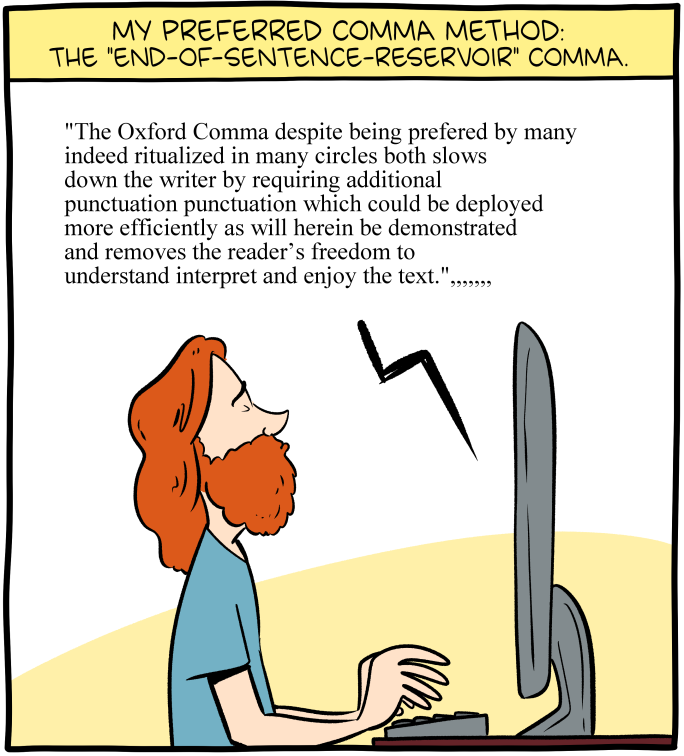Plagarized Punctuation Guide #1
I give credit, though. This is from https://allthingsfreelancewriting.com/blog/punctuation-guide/
The article is just too good not to share. More next time.
Dashes may seem pretty simple and straightforward. But did you know there are three main types — the en dash, em dash, and triple-em dash? Here, we’ll cover all three (plus the hyphen which can be easily confused with a dash).
- hyphen (-)
- en dash (–)
- em dash (—)
- triple em dash (— — —) [This one is new to me]
Hyphens
The hyphen (-) is not technically a dash, but it looks like a short one.
How to type a hyphen
Hyphens are easy to type as they have a dedicated key on U.S. keyboards that’s shared with the underscore.
When to use hyphens
Hyphens should be used when:
- A word has more than one syllable and is divided between two lines.
- You want to spell out a word letter by letter in your writing (g-o-o-d-b-y-e).
- You need to join two or more words to form compound adjectives before a noun (kind-hearted person).
- Two vowels make a word awkward (pre-elect).
- A lack of a hyphen would cause the word to be misread (re-creation).
- You write compound numbers (thirty-two).
- You want the text to be read as a stutter (I’m s-s-s-sorry).
- You use certain prefixes like all- and self- (self-sufficient).
- You use certain suffixes like -elect (president-elect).
En dashes
The en dash (–) is a dash that’s the length of the letter “n.”
How to type an en dash
You can type an en dash on a Mac by pressing the “option” key and the hyphen key at the same time. On Windows, press the “Alt” key, type 0150, and release the “Alt” key.
When to use en dashes
En dashes are used to replace the words “to” and “through” in ranges of numbers, spans of time, and scores. For example:
- I read chapters 1–3 of my book.
- The seasonal resort is open April–October.
- The Eagles are winning 21–19.
They’re also used if you’re writing a compound adjective and a hyphen doesn’t work. This often happens when the compound adjective is a proper noun. Here’s an example:
- She’s a Pulitzer Prize–winning journalist.
You wouldn’t put a hyphen between Pullitzer and Prize so you add the en dash which tells the reader the two preceding words are part of the compound adjective.
Em dashes
Now, for the favorite of many writers — the em dash. Em dashes are longer dashes that are the length of the letter “m.”
How to type an em dash
To type an em dash on a Mac, press “option+shift+hyphen key” at the same time. Note, some mac keyboards have an “alt” key instead of the “option” key. On a PC, press “control+alt+hyphen key.”
If you have trouble, you can always head over to Google, search for em dash, and copy and paste the mark into your document.
When to use em dashes
Em dashes are a very versatile type of punctuation that can be used to replace other marks, such as parentheses or commas. They work well when you want to set information apart, mark an abrupt turn in a sentence, or expand on something without creating a run-on sentence.
Here are some examples:
- My favorite dress — which had beautiful floral appliques all over it — was destroyed in the wash.
- I love to cook — I’m always trying new recipes.
- We went to the lake and had a great day but — never mind, I don’t want to talk about it.
3-em dashes
The 3-em dash is created by typing the em dash three times in a row with spaces between each em dash (— — —)
When to use 3 em dashes
The 3-em dash is commonly used by journalists to signal that words have been left out or names have been omitted — like names of sources who don’t want to go on the record.
It can also be used to cite works by the same author in a Chicago format paper.
Subscribe to this blog's RSS feed
Another Hyphen Lesson
First, let’s look at the comic, specifically the words “to do.” How correct are these, and why?

Okay, the answers:
- Panel 1: Let’s don’t call it a little dash. Call it a hyphen.
- Panel 2: Here “to-do” is a compound noun. The hyphen is okay. (I think she’s using “to-do’s” as an activity, not as punctuation.)
- Panel 3: Here he’s using it as a verb. Should not have a hyphen.
- Final panel: Here “to-do” is a compound adjective. Hyphen is correct.
How did you do?
I Don’t Think This is True
But I’m not going to bother to look it up. Seems to me that we didn’t use punctuation back then.
I think most of our punctuation appeared in the middle ages.
By the way, don’t forget to pronounce that second “s.” It’s aster riSk, not aster rick.
Punctuation Matters
I think I mentioned this topic before. Here’s another good example of how punctuation can change the meaning of a phrase.
As written in the comic, you have a compound phrase about the two things that the person is doing. The original is “downward-facing dog.” “Downward-facing” is a compound adjective describing “dog.”
So the punctuation makes the joke!
Don’t Do This!
Need convincing that punctuation is optional? Read this:
And I have a question for you: Did he put the right number of commas at the end???



